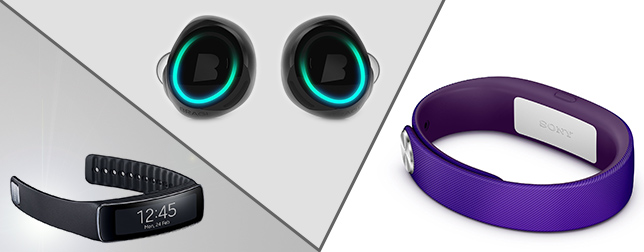Wearables Go Big at the Mobile World Congress
Many companies presented their new wearables at the Mobile World Congress in Barcelona. Samsung introduced three new products: The second generation Galaxy Gear smartwatch, one of which now has a camera built into the housing, and a simpler model that comes without a camera. In contrast to the first, Android-based generation, the new smartwatches run on the Linux-based operating system Tizen. The Gear Fit is Samsung’s first activity tracker that comes with a touch screen and can now also display notifications, control music and do much more. All three new Samsung wearables provide the optical heart rate monitoring we’re accustomed to from Mio or Basis, making them a great choice for fitness enthusiasts. Sony presented its activity tracker SmartBand, which comes in the form of various fashionable wristbands. The app for the Smartband is called Lifelog and can aggregate data from many different sources in order to provide an overview over all areas of life. Sony also presented a lifelogging camera in Barcelona, demonstrating that the company is taking a rather holistic approach to self-tracking. Wearable technology was certainly one of the biggest upcoming trends claimed Intel and devoted a panel discussion to the topic Wearable Technologies: Challenges and Opportunities.
Wearables and Jewelry Are Becoming One
In the past, wearables have often been criticized as ugly, clumsy plastic devices. Even though we have seen some improvements lately, manyfashionistas still haven’t been convinced. While Misfit was one of the first companies to address the issue, FitBit, the pioneer in activity trackers, recently followed suit with its competitor’s strategy when it announced its partnership with fashion designer Tory Burch. Cuff went a step further when it presented its wearable jewelry that lets users call loved ones for help when in danger. The CuffLink is a small device that can be slipped onto wristbands, bracelets, key rings and many other handy places. Connected with a smartphone, Cuff sends an alert to those close-by along with the location of the person in need, all at the press of a button. With an integrated battery that lets Cuff run for an entire year, the new technology has great solutions for the issues of usability and design and should garner higher acceptance even from wearable skeptics.
The Dash – Bluetooth Headphones Define a New Category
Last month we had the Glyph in the news round-up, with its amazing approach to vision. This month, the Dash is running a brand new campaign for its highly innovative audio product. The in-ear headphones are an amazing combination of a blue-tooth headset with a self tracking gadget, packed into a tiny pair of ear-buds. The Dash not only lets you listen to music from your phone and place calls, it also has a built-in MP3 player for standalone music playback on the go, even when swimming. On the fitness side, The Dash has a built-in heart rate monitor, accelerometer and can measure the oxygen saturation in your bloodstream. The crowd-funded campaign has been a great hit so far, you can still order a pair of the headphones for delivery planned on November 14.
Make Siri Your Personal Fitness Coach and Earn Good Karma for Healthy Living
So far, we have seen many different approaches to making sense of the data recorded with self-tracking devices. One approach that seems perfectly reasonable is to expand the personal assistant Siri, which is already included in every iPhone. Former apple employee Nikola Hu recently announced his take on fitness improvement, a wearable device that gives you instantaneous feedback while walking, running, boxing, cycling or swimming. The 3D motion sensors can be worn as a wristband, an ankle band or attached to the pedals of your bike and from there are connected to your iPhone via bluetooth. Siri can then provide you with feedback that lets you improve your performance, thus making Moov an artificial intelligence fitness coach. It’s available for preorder on moov.cc for $59. Delivery is planned for this summer.
Another approach to building on self-tracking data comes from the Indian startup GOQii. Its wristband tracks users’ activity and sleep, helping them improve with the support of human coaches, and allows them to earn Karma points for their healthy lifestyle. In partnership with sponsors on GOQii’s plattform, the Karma points can then be used to donate real money to good causes all over the world. While the concept of fitness tracking isn’t new at all, both Moov and GOQii demonstrate that there are still many new great ideas on improving health and well-being with wearable technologies.
Images: Samsung, Sony, Bragi, Cuff










